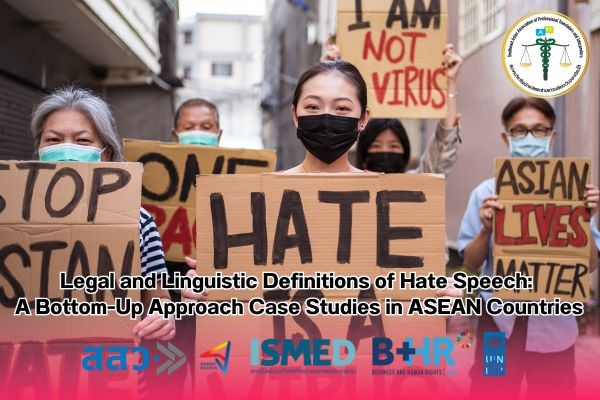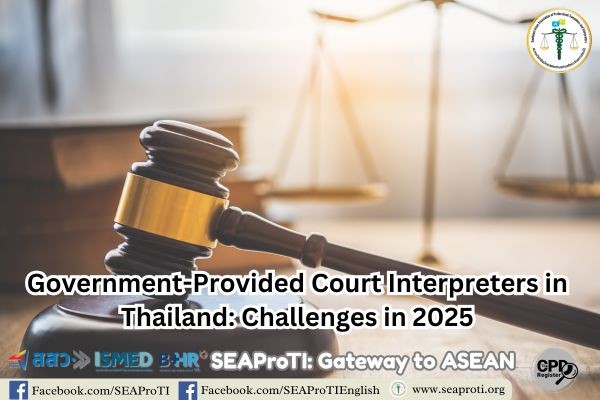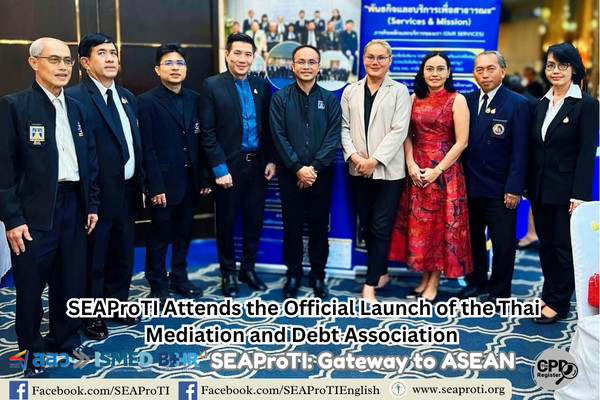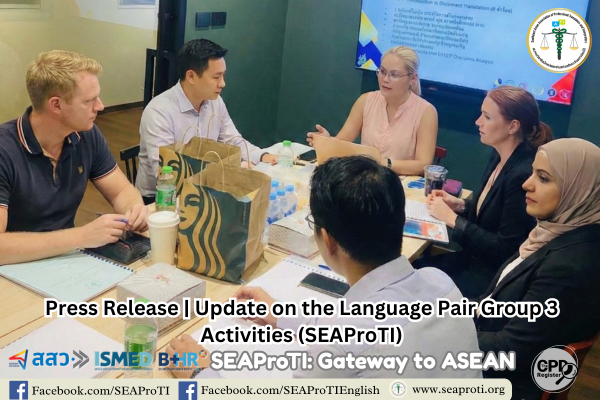Legal and Linguistic Definitions of Hate Speech: A Bottom-Up Approach
Case Studies in ASEAN Countries
23 August 2025
Hate Speech (HS) is a complex phenomenon that poses challenges in both legal and linguistic domains. This article presents a bottom-up approach using in-depth case studies in ASEAN countries such as Singapore, Thailand, Indonesia, Myanmar, Malaysia, and the Philippines to examine patterns of prosecution and the impact on freedom of expression. The findings reveal that although many countries have laws regulating HS, interpretation and enforcement often remain ambiguous and discriminatory. A bottom-up approach helps to understand HS through linguistic forms and real contexts—ranging from the roles of speakers and recipients to broader social and psychological impacts. This article also links the definition of HS with forensic linguistic research in the region, drawing on the work of SEAProTI, which highlights the necessity of integrating linguistic and legal knowledge in Thai and ASEAN contexts.
Introduction
The ASEAN region is characterized by its ethnic, religious, and linguistic diversity, creating significant challenges in defining HS. Relevant laws often rely on general provisions such as defamation, incitement, or specific laws such as Thailand’s lèse-majesté law (Section 112) and Indonesia’s blasphemy laws. However, forensic linguistic research shows that purely legal definitions cannot fully capture the phenomenon in real social contexts (SEAProTI, 2025).
Country Case Studies
Singapore
- Sedition Act 1948: Criminalizes words inciting hatred between races or religions.
- Public Prosecutor v. Benjamin Koh (2005): The court convicted the defendant for posting comments against Malays and Muslims, even without explicit intent.
- Subhas Nair (2019): A rapper sentenced to six weeks’ imprisonment for criticizing a “brownface advertisement”; the court held that the act fostered racial division.
Thailand
- Lèse-majesté law (Section 112): Provides penalties of up to 15 years’ imprisonment per offense for insulting or threatening the King.
- Paul Chambers (2025): A foreign academic arrested for lecturing on the monarchy; bail was denied, sparking international academic debate.
- Former PM Thaksin Shinawatra: Acquitted of lèse-majesté charges by the Criminal Court due to insufficient evidence; the cited video was found to be edited.
Indonesia
- Ahok case (2017): Jakarta’s governor sentenced to two years’ imprisonment for referencing the Qur’an; the court held the remarks incited “religious enmity.”
- Ratu Thalisa (2025): A transgender influencer sentenced to 2 years and 10 months in prison for joking about Jesus in a livestream.
- Alexander Aan (2012): Imprisoned for 2.5 years after posting “God does not exist,” which was deemed religious incitement.
Myanmar
The spread of HS on Facebook by Buddhist nationalist groups fueled violence against the Rohingya in 2017. A UN report noted that the absence of a clear domestic definition of HS hindered effective legal responses.
Malaysia and the Philippines
- Malaysia: Applies the Sedition Act, similar to Singapore, but often criticized as a political tool.
- Philippines: Relies on the Cybercrime Prevention Act and criminal defamation law, but lacks a clear HS definition.
Discussion
Analysis reveals that:
- Legal language is broad and vague (e.g., “ill-will,” “religious hatred”), making interpretation discretionary.
- Freedom of expression is significantly affected, particularly in Thailand and Indonesia, where laws intersect with political issues.
- Real-world cases highlight linguistic dimensions: HS often involves more than insults, including discursive strategies such as delegitimization (“making women or minorities unworthy of conversation”) or coercive speech acts.
SEAProTI (2025) suggests that understanding HS requires not only categorizing laws but also applying linguistic tools such as speech act analysis and Critical Discourse Analysis (CDA) to ensure “descriptive adequacy” and responsiveness to social realities.
Conclusion
Although many ASEAN countries have legal frameworks to regulate HS, they lack clarity and consistency in interpretation. Case studies—from Indonesia’s female influencer to Thailand’s Section 112—illustrate the tension between preventing speech-induced violence and safeguarding freedom of expression. This article proposes that a bottom-up, context-based, linguistically informed approach is the most suitable way to build a comprehensive and balanced definition of HS.
References
- Council of Europe. (1997). Recommendation No. R(97)20 on “Hate Speech”. Strasbourg: Council of Europe.
- Gelber, K., & McNamara, L. (2016). Evidencing the harms of hate speech. Social Identities, 22(3), 324–341. https://doi.org/10.1080/13504630.2015.1128810
- George, C. (2016). Freedom from the press: Journalism and state power in Singapore. NUS Press.
- Maitra, I., & McGowan, M. K. (2012). Speech and harm: Controversies over free speech. Oxford University Press.
- PRISM Project. (2015). Analysis and prevention of hate speech in the EU. Brussels: European Commission.
- SEAProTI. (2025). Proceedings of the Conference on Forensic Linguistics and Legal Interpretation in Thai Courts. Southeast Asian Association of Professional Translators and Interpreters.
- Setiawan, K. (2020). The politics of blasphemy law in Indonesia: Judicialization of religion in a democratizing society. Asian Studies Review, 44(1), 33–50. https://doi.org/10.1080/10357823.2019.1697487
- Streckfuss, D. (2011). Truth on trial in Thailand: Defamation, treason, and lèse-majesté. Routledge.
About Certified Translators, Translation Certification Providers, and Certified Interpreters of SEAProTI
The Southeast Asian Association of Professional Translators and Interpreters (SEAProTI) has announced the criteria and qualifications for registration of Certified Translators, Translation Certification Providers, and Certified Interpreters of the Association. These criteria were published under Sections 9 and 10 of the Royal Thai Government Gazette, Secretariat of the Cabinet, Office of the Prime Minister, on 25 July 2024, Vol. 141, Part 66 Ng, p. 100. Full text available here: The Royal Thai Government Gazette
The Office of the Council of State has proposed issuing a Royal Decree stipulating that registered translators—including certification providers from professional associations or accredited language training institutions—be legally empowered to certify translations (Letter to SEAProTI dated 28 April 2025).
SEAProTI is the first professional association in Thailand and Southeast Asia to establish a formal certification system for Certified Translators, Translation Certification Providers, and Certified Interpreters.
Headquarters:
33 Baan Rajakhru Building, Room 402, Soi Phahonyothin 5, Phahonyothin Road, Phayathai Sub-district, Phayathai District, Bangkok 10400, Thailand
Email: hello@seaproti.com
Phone: (+66) 2-114-3128 (Office Hours: Monday–Friday, 09:00–17:00)
นิยามทางกฎหมายและภาษาศาสตร์ของคำพูดแสดงความเกลียดชัง: วิธีการจากล่างขึ้นบน
กรณีศึกษาในกลุ่มประเทศอาเซียน
23 สิงหาคม 2568
บทคัดย่อ
คำพูดแสดงความเกลียดชัง (Hate Speech: HS) เป็นปรากฏการณ์ที่ซับซ้อนท้าทายทั้งทางด้านกฎหมายและภาษาศาสตร์ บทความนี้นำเสนอแนวทางจากล่างขึ้นบน (bottom-up approach) โดยใช้กรณีศึกษาเชิงลึกในประเทศอาเซียน เช่น สิงคโปร์ ไทย อินโดนีเซีย เมียนมา มาเลเซีย และฟิลิปปินส์ เพื่อศึกษารูปแบบการดำเนินคดีและผลกระทบต่อเสรีภาพการแสดงออก ผลการศึกษาแสดงให้เห็นว่าแม้หลายประเทศจะมีกฎหมายควบคุม HS แต่การตีความและบังคับใช้มักมีความไม่ชัดเจนและเลือกปฏิบัติ วิธีการจากล่างขึ้นบนช่วยให้เข้าใจ HS ผ่านรูปแบบภาษาและบริบทจริง ตั้งแต่บทบาทของผู้พูดและผู้รับสาร ไปจนถึงผลกระทบทางสังคมและจิตใจ บทความนี้ยังเชื่อมโยงการนิยาม HS กับการวิจัยทางนิติภาษาศาสตร์ในภูมิภาค โดยอ้างอิงงานของ SEAProTI ที่ชี้ให้เห็นถึงความจำเป็นในการบูรณาการความรู้ด้านภาษาและกฎหมายในบริบทไทยและอาเซียน
บทนำ
ภูมิภาคอาเซียนมีความหลากหลายทางชาติพันธุ์ ศาสนา และภาษา ซึ่งก่อให้เกิดความท้าทายอย่างยิ่งในการนิยาม HS กฎหมายที่เกี่ยวข้องมักอาศัยบทบัญญัติทั่วไป เช่น หมิ่นประมาท ยุยงปลุกปั่น หรือกฎหมายเฉพาะ เช่น กฎหมายหมิ่นพระบรมเดชานุภาพ (Section 112) ของไทย และกฎหมายหมิ่นศาสนา (blasphemy laws) ของอินโดนีเซีย อย่างไรก็ดี งานวิจัยทางนิติภาษาศาสตร์พบว่าการนิยามในเชิงกฎหมายเพียงอย่างเดียวไม่สามารถสะท้อนปรากฏการณ์จริงในสังคมได้ (SEAProTI, 2025)
กรณีศึกษาประเทศต่าง ๆ
สิงคโปร์
- Sedition Act 1948 ใช้ลงโทษถ้อยคำที่ก่อให้เกิดความเกลียดชังระหว่างเชื้อชาติหรือศาสนา
- Public Prosecutor v. Benjamin Koh (2005): ศาลตัดสินว่าผู้ต้องหาที่โพสต์ข้อความโจมตีชาวมลายูและมุสลิมมีความผิด แม้ไม่มีเจตนาตรงไปตรงมาก็ตาม
- Subhas Nair (2019): แร็ปเปอร์ถูกตัดสินจำคุก 6 สัปดาห์จากการวิพากษ์ “brownface advertisement” ศาลเห็นว่าการกระทำนั้นสร้างความแตกแยกทางเชื้อชาติ
ไทย
กฎหมายหมิ่นพระบรมเดชานุภาพ (Section 112) กำหนดโทษสูงสุดถึง 15 ปีต่อความผิดหนึ่งกรรมหากมีการดูหมิ่นหรือข่มขู่พระมหากษัตริย์
- Paul Chambers (2025): นักวิชาการต่างชาติถูกจับกุมจากการบรรยายเกี่ยวกับสถาบันพระมหากษัตริย์ ศาลไม่อนุญาตให้ประกันตัว ก่อให้เกิดการวิพากษ์ในเวทีวิชาการนานาชาติ
- อดีตนายกฯ ทักษิณ ชินวัตร: ศาลอาญายกฟ้องคดีหมิ่นพระบรมเดชานุภาพ เนื่องจากไม่มีพยานหลักฐานเพียงพอและคลิปวิดีโอที่อ้างอิงถูกตัดต่อ
อินโดนีเซีย
- คดี Ahok (2017): ผู้ว่าฯ จาการ์ตาถูกจำคุก 2 ปีจากการอ้างอิงอัลกุรอาน ศาลชี้ว่าถ้อยคำดังกล่าวก่อให้เกิด “ศัตรูทางศาสนา”
- Ratu Thalisa (2025): อินฟลูเอนเซอร์ทรานส์ถูกตัดสินจำคุก 2 ปี 10 เดือนจากการพูดล้อเลียนพระเยซูในการไลฟ์สด
- Alexander Aan (2012): ถูกจำคุก 2.5 ปี หลังโพสต์ว่า “God does not exist” ซึ่งถูกตีความว่าเป็นการยุยงความเกลียดชังต่อศาสนา
เมียนมา
การเผยแพร่ HS ใน Facebook โดยกลุ่มชาตินิยมชาวพุทธมีส่วนกระตุ้นความรุนแรงต่อชาวโรฮิงญาในปี 2017 รายงานของ UN ระบุว่าการขาดนิยาม HS ที่ชัดเจนในกฎหมายภายในเป็นปัจจัยที่ทำให้การจัดการปัญหาไม่มีประสิทธิภาพ
มาเลเซียและฟิลิปปินส์
- มาเลเซีย: ใช้ Sedition Act คล้ายกับสิงคโปร์ แต่มีเสียงวิจารณ์ว่าใช้เป็นเครื่องมือทางการเมือง
- ฟิลิปปินส์: อาศัย Cybercrime Prevention Act และกฎหมายหมิ่นประมาททางอาญา แต่ยังไม่มีนิยาม HS ที่ชัดเจน
อภิปราย
การวิเคราะห์แสดงให้เห็นว่า:
- กฎหมายมีภาษากว้างและกำกวม เช่น “ill-will” หรือ “religious hatred” ทำให้การตีความขึ้นอยู่กับดุลยพินิจ
- เสรีภาพการแสดงออกถูกกระทบ โดยเฉพาะในกรณีไทยและอินโดนีเซียที่มีการใช้กฎหมายกับประเด็นการเมือง
- กรณีจริงชี้ให้เห็นมิติทางภาษา HS มักไม่ใช่เพียงการด่าทอ แต่รวมถึงกลยุทธ์ทางวาทกรรม เช่น การทำให้ผู้หญิงหรือชนกลุ่มน้อย “ไม่คู่ควรแก่การสนทนา” (delegitimization) หรือการออกคำสั่งรุนแรง
SEAProTI (2025) เสนอว่าการทำความเข้าใจ HS ต้องไม่หยุดเพียงการระบุหมวดหมู่กฎหมาย แต่ควรใช้เครื่องมือวิเคราะห์ทางภาษา เช่น การวิเคราะห์วัจนปฏิบัติ (speech act analysis) และการวิเคราะห์วาทกรรมเชิงวิพากษ์ (CDA) เพื่อให้กฎหมายมี “ความเพียงพอเชิงพรรณนา” (descriptive adequacy) และตอบสนองต่อความจริงในสังคม
สรุป
แม้ประเทศอาเซียนหลายประเทศจะมีกฎหมายเพื่อควบคุม HS แต่ยังขาดความชัดเจนและความสอดคล้องในการตีความ กรณีศึกษาสตรีในอินโดนีเซียหรือคดีหมิ่นพระบรมเดชานุภาพ (Section 112) ในไทย แสดงให้เห็นความท้าทายระหว่าง การป้องกันความรุนแรงจากถ้อยคำ กับ การคุ้มครองเสรีภาพในการแสดงออก บทความนี้เสนอว่า แนวทางจากล่างขึ้นบนซึ่งอิงข้อมูลจริงและการวิเคราะห์เชิงภาษา คือแนวทางที่เหมาะสมในการสร้างนิยาม HS ที่ครอบคลุมและสมดุล
บรรณานุกรม
- Council of Europe. (1997). Recommendation No. R(97)20 on “Hate Speech”. Strasbourg: Council of Europe.
- Gelber, K., & McNamara, L. (2016). Evidencing the harms of hate speech. Social Identities, 22(3), 324–341. https://doi.org/10.1080/13504630.2015.1128810
- George, C. (2016). Freedom from the press: Journalism and state power in Singapore. NUS Press.
- Maitra, I., & McGowan, M. K. (2012). Speech and harm: Controversies over free speech. Oxford University Press.
- PRISM Project. (2015). Analysis and prevention of hate speech in the EU. Brussels: European Commission.
- SEAProTI. (2025). รายงานการประชุมวิชาการนิติภาษาศาสตร์และการตีความทางกฎหมายในศาลไทย. สมาคมวิชาชีพนักแปลและล่ามแห่งเอเชียตะวันออกเฉียงใต้.
- Setiawan, K. (2020). The politics of blasphemy law in Indonesia: Judicialization of religion in a democratizing society. Asian Studies Review, 44(1), 33–50. https://doi.org/10.1080/10357823.2019.1697487
- Streckfuss, D. (2011). Truth on trial in Thailand: Defamation, treason, and lèse-majesté. Routledge.
เกี่ยวกับนักแปลรับรอง ผู้รับรองการแปล และล่ามรับรองของสมาคมวิชาชีพนักแปลและล่ามแห่งเอเชียตะวันออกเฉียงใต้
* สมาคมวิชาชีพนักแปลและล่ามแห่งเอเชียตะวันออกเฉียงใต้ (SEAProTI) ได้ประกาศหลักเกณฑ์และคุณสมบัติผู้ที่ขึ้นทะเบียนเป็น “นักแปลรับรอง (Certified Translators) และผู้รับรองการแปล (Translation Certification Providers) และล่ามรับรอง (Certified Interpreters)” ของสมาคม หมวดที่ 9 และหมวดที่ 10 ในราชกิจจานุเบกษา ของสำนักเลขาธิการคณะรัฐมนตรี ในสำนักนายกรัฐมนตรี แห่งราชอาณาจักรไทย ลงวันที่ 25 ก.ค. 2567 เล่มที่ 141 ตอนที่ 66 ง หน้า 100 อ่านฉบับเต็มได้ที่: นักแปลรับรอง ผู้รับรองการแปล และล่ามรับรอง
** สำนักคณะกรรมการกฤษฎีกาเสนอให้ตราเป็นพระราชกฤษฎีกา โดยกำหนดให้นักแปลที่ขึ้นทะเบียน รวมถึงผู้รับรองการแปลจากสมาคมวิชาชีพหรือสถาบันสอนภาษาที่มีการอบรมและขึ้นทะเบียน สามารถรับรองคำแปลได้ (จดหมายถึงสมาคม SEAProTI ลงวันที่ 28 เม.ย. 2568)
*** สมาคมวิชาชีพนักแปลและล่ามแห่งเอเชียตะวันออกเฉียงใต้ เป็นสมาคมวิชาชีพแห่งแรกในประเทศไทยและภูมิภาคเอเชียตะวันออกเฉียงใต้ที่มีระบบรับรองนักแปลรับรอง ผู้รับรองการแปล และล่ามรับรอง
สำนักงานใหญ่: อาคารบ้านราชครู เลขที่ 33 ห้อง 402 ซอยพหลโยธิน 5 ถนนพหลโยธิน แขวงพญาไท เขตพญาไท กรุงเทพมหานคร 10400 ประเทศไทย
อีเมล: hello@seaproti.com
โทรศัพท์: (+66) 2-114-3128 (เวลาทำการ: วันจันทร์–วันศุกร์ เวลา 09.00–17.00 น.)

























